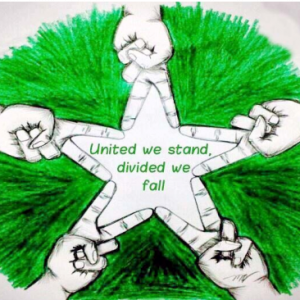AMIR ULLAH KHAN
National integration is one of the most debatable issues in developing countries like Pakistan. It is a wider concept. However, it can be simply understood as “the bringing of diverse communities with multi-socio-cultural vales, multi-lingual, multi-religious, multi-sectarian, multi-ethnic, multi-racial with historical orientation and with heterogeneous politico-economic ideologies under the umbrella of one-nation with sense of nationhood”. In the present world, two states – Pakistan and Israel – have been established based on religious ideology, the latter has homogeneous society contrary to Pakistan that is pluralistic in nature.

and are involved to satisfy their own stakes. They are engaged to make laws for protection of their own interests. Fourth, the political leaders and political parties are also engaged in blame-shift game and none of these is ready to shoulder responsibility for the repercussions of its policies. Fifth, political leaders also rely upon ethnic-based politics to broaden their vote bank. Unfortunately, they lack national outlook. Sixth, they prefer confrontational politics instead of politics of reconciliation and cooperation based upon democratic principles and meritocracy. Eight, the political leaders are engaged in brainwashing the minds of students in academic institutions especially universities and create hate in their minds against their fellow beings and security agencies of Pakistan for political scoring. Lastly, the political parties lack a sustainable economic policy, which leads them to rely on aid from International Financial Institutions like World Bank, Asian Development Bank, and International Monetary Fund.
into Federal capital territory, four federating units, and other autonomous regions; and also distributed legislative, financial, and administrative powers between the federal government and federating units with aim to form harmonious relationship between federation and federating units, besides among the federating units themselves; also to protect the rights of the smaller provinces through constitutional and political means.
Various obstacles hinder national integration in Pakistan. First, the political leaders are involved in politicising national and local problems of the common man for no reason except for personal political consideration. Second, they betray common people and exploit their sentiments. Third, they overlook the well-being of their electors
The governments in Pakistan pay the loans but fail to pay the interests on those loans. The government for this reason maximise the tax-base by levying huge taxes on common people which further exacerbate their miseries and also leads to poverty instead of poverty alleviation.
These issues gravely caused political instability in Pakistan. It is high time to take serious notice of the historical political blunders and those of current ones to come out of political and economic turmoil and to make Pakistan politically and ultimately economically stable to establish a true welfare state wherein the common man enjoys political, social, and economic justice. The political leaders need to come on table to design a sustainable economic policy to get rid of Global Monetary Institutions’ clutches. The government needs to stop issuing fund to legislators because their main job is to legislate for the welfare of the people. Across the board, accountability must be ensured and political victimisation needs to be stopped. The local people must be part of the local projects to address their grievances. The national institutions and organisations like Pakistan Railway, Pakistan International Airline and Pakistan Steel Mill etc need be strengthened and losses must be addressed through comprehensive policies. The political leaders must resolve their issues on the floor of the parliament instead of roads, agitation and confrontation.
The political leaders need to stop politicising the security agencies like Pakistan Army and Inter-Services Intelligence because it will damage the morale of Jawans deputed at National borders to safeguard people against external aggression and threat. In the nutshell, it can be said that ‘God does not change the fate of those who do not strive to change by themselves’. Nothing is impossible but strong resolve and will is needed. We therefore need to think and act as Pakistani; and to vow to live and die in Pakistan.
About the Author:
The Author is Chairman, Department of Political Science, Islamia College University Peshawar (ICP),